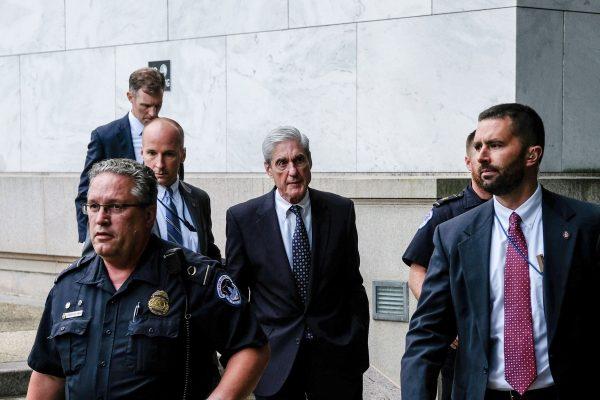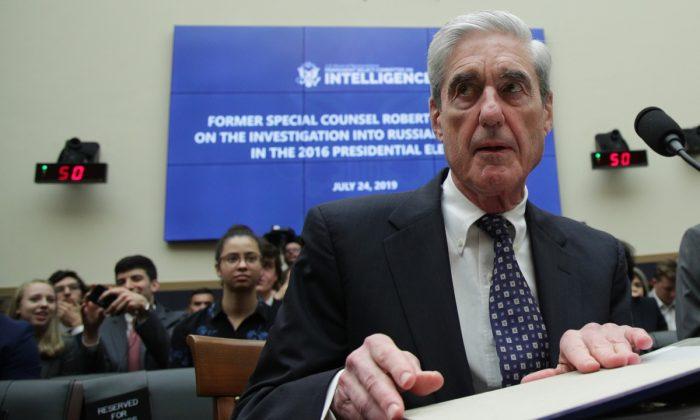Former Special Counsel Robert Mueller testified before two House committees on July 24, choosing to answer some questions but dodge others about his report on alleged Russian interference in the 2016 presidential election. Mueller’s report concluded that the Russian government had interfered in the 2016 presidential election but that there had been no collusion between Russia and the Trump Campaign.
Democratic Chairman Jerrold Nadler (D-NY) characterized the hearing as an effort to pursue accountability.
“We will act with integrity,” Nadler said. “We will follow the facts where they lead. We will consider all appropriate remedies. We will make our recommendation to the House when our work concludes.”
The hearing bounced back and forth between Democrats and Republicans, with Democrats keeping their line of questioning within the boundaries of the report—reading quotes and showing slides of it, and repeatedly asking Mueller if President Donald Trump had obstructed his investigation.
Marc Ruskin, a former assistant district attorney in Brooklyn, New York, and FBI veteran of 27 years, told The Epoch Times he thinks the tactic of the Democrats was to have Mueller confirm facts from the report which were already public domain information.
Cause and Effects
Ruskin said the outcome of the hearing is unlikely to have a significant impact.“I think in all likelihood a very small percentage of the public is going to be watching it.
“What they’re going to see are clips on the networks that they prefer to watch and the clips are going to be selected based on the political point of view of the network.”
He added, “MSNBC and CNN are going to be showing excerpts which dramatically recapture the conclusions being made by the hostile representatives, and so people will have their own existing points of view reinforced in all likelihood.”
Ruskin also said that he thought Nadler and other representatives with similar points of view were hoping that the publicizing of the hearings would have some kind of dramatic impact.
Ruskin, who is also an adjunct professor at the John Jay College of Criminal Justice, a former legislative staffer for U.S. Sen. Daniel Patrick Moynihan, and the author of “The Pretender: My Life Undercover for the FBI,” said he thought those hopes were “overblown and optimistic on their part, and unlikely to be realized.”
Republicans pressed Mueller on matters absent from the report, including investigative leads on the origins of the Steele dossier, the Clinton campaign, and Fusion GPS.
Republicans have been vocal in their questioning into whether the Mueller investigation was triggered by the now-discredited contents of the Steele dossier, which was partly funded by the Clinton campaign and the Democratic National Committee.
Can’t Get Into That
Mueller avoided answering questions on areas outside his report, but that didn’t stop Republicans from pointing out the flaws and perceived bias in his investigation.Some of Mueller’s most common answers to Republicans were to refer back to the report, saying: “It’s not my purview,” and, “Can’t get into that.”
Rep. Matt Gaetz (R-Fla.) pressured Mueller on why the creator of the Steele dossier, Christopher Steele, wasn’t investigated thoroughly.
“Either Steele made this whole thing up and there were never any Russians telling him of this vast criminal conspiracy that you didn’t find, or Russians lied to Steele,” Gaetz said. “Now if Russians were lying to Steele to undermine our confidence in our duly elected president, that would seem to be precisely your purview because you stated in your opening that the organizing principle was to fully and thoroughly investigate Russia’s interference.”

Gaetz implied Mueller wasn’t interested in whether the Russians were interfering or not through Christopher Steele, and asked why Steele wasn’t charged if he was lying during the investigation.
“It’s not your purview to look into whether or not Steele is lying?” Gaetz asked. “It’s not your purview to look into whether or not anti-Trump Russians are lying to Steele, and it’s not your purview to look at whether or not Glenn Simpson was meeting with the Russians the day before and the day after you write 3,500 words about the Trump campaign meeting. So I’m wondering how these decisions are guided.”
Jim Jordan (R-Ohio) said he found it amazing that the man allegedly responsible for starting the false accusations that led to a “three-year saga” investigation, Joseph Mifsud, was never charged for lying to the FBI.





